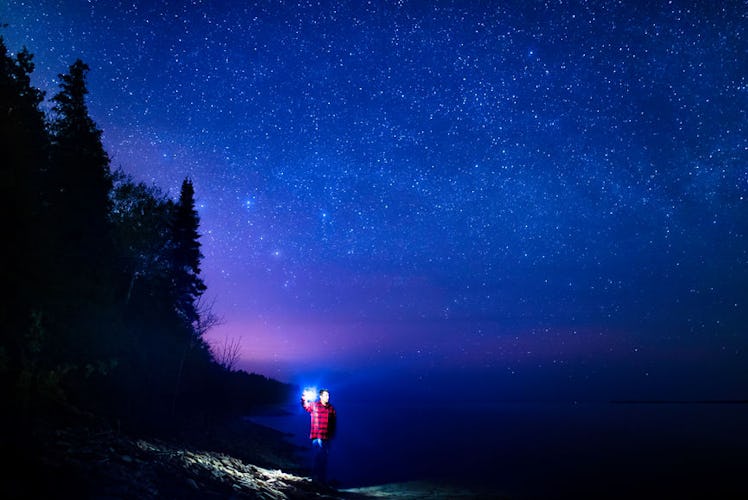
The Leonids Meteor Shower Meaning Will Have You Dreaming Of Shooting Stars
When was the last time you saw a shooting star? Take a moment to sort through your memories and relive it. Did it flash across the sky when you least expected it? Did you drop everything you were doing to quickly make a wish, hoping you weren't too late? Perhaps it happened exactly when you needed it. Maybe you were going through a hard time and then that shooting star lit up your entire world, giving you a glimmer of hope. Whether you believe in magic or not, a shooting star arrives to remind you that your existence is truly minuscule compared to how infinite the universe is. Even if your problems seem overwhelming, a shooting star proves that none of it really matters. At the end of the day, shooting stars are forever. They've darted through the night since long before human beings ever existed, and they will continue to do so long after we're gone. But, I digress, because if you honestly can't remember the last time you saw a shooting star, then the Leonids meteor shower meaning is something you definitely don't want to forget.
After all, it's truthfully one of the most dazzling meteor showers there are, and if it's been a long time since you've made a cosmic wish, you better start making plans now. It's happening sooner than you think.
What Are The Leonids Meteor Shower?
Obviously, shooting stars aren't literally shooting stars (although we should never give up on that poetry). According to Space.com, the Leonids meteor shower is constituted by particles of dust and debris (or "meteoroids", as is the proper term) that originated from the comet Temple-Tuttle. Whenever Temple-Tuttle crosses over Earth's orbit, it gifts us with a fiery show as its rocky detritus blasts through our atmosphere.
As you may have already guessed, the Leonids meteor shower gets its moniker from the constellation Leo, as stated by EarthSky.org. The constellation Leo is the point in the sky from which the Leonids tend to travel from, although they always come from slightly different directions every year.
The Leonids are also one of the most highly anticipated meteor showers of them all. It probably has something to do with the fact that it can entail as many as 50,000 meteors per hour, according to Space.com.
When Are The Leonids Meteor Shower 2018?
According to TimeAndDate.com, the Leonids meteor shower takes place every year, with peak activity often occurring on Nov. 17 and Nov. 18. True to form, the Leonids meteor shower will abide by tradition and reach its fullest potential on those exact dates once again, so mark your calendars. Lucky for us, Nov. 17 and Nov. 18 will even land on a Saturday and a Sunday this year.
How Can I See The Leonids Meteor Shower 2018?
As always, it's best to travel somewhere far away from the light pollution of the city to be able to clearly see any shooting stars during a meteor shower. The fact that the Leonids meteor shower will take place at the same time as a waxing gibbous moon is slated to dominate the night sky with its lunar light means you should go somewhere especially rural. EarthSky.org even recommends that you watch the cosmic show from a city, state, or national park. They also state that you should aim to watch the meteor shower in the early morning hours between midnight and dawn.
TimeAndDate.com also recommends that you allow around 15 to 20 minutes for your eyes to adjust to the darkness before you watch the Leonids. This means you should put away the screens and turn off any remaining light. Social media can wait, because you don't want to miss any opportunities to make a wish.